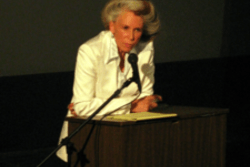Finally, a Positive, Feminist Jewish Take on Sex
The premise of The Intimacy Experiment, a new book by Rosie Danan, sounds conventional enough: A business mogul helps a rabbi boost synagogue attendance through a series of self-help talks. But there’s a twist: The business mogul, Naomi, is a former porn star, and the discussions she leads encourage congregants to explore their relationship to romance and sex. Because this is a romance novel, the protagonists eventually fall in love, and the reader is treated to heart-pounding scenes of the couple’s sexual exploration. But what really stood out to me was the book’s radically sex-positive and feminist perspective, one we don’t see enough in Jewish spaces.
When trying to convince Naomi to take the job as guest lecturer at his synagogue, Rabbi Ethan says he hopes she will “show [younger people] that Judaism and their [sexual] lifestyles are complementary rather than at odds.” With this, Ethan acknowledges that many younger Jewish community members feel uncomfortable with traditional Judaism’s black-and-white stance on which types of sex are okay and which aren’t. The Torah, for example, refers to marriage as kiddushin, the Hebrew word for “holy.” This implies that sex outside of marriage is “unholy,” which is why traditional Judaism generally frowns upon the practice. Similarly, the Book of Leviticus in the Torah talks about menstruating individuals as “unclean,” which has led to the stigmatizing of sex during menstruation.
Naomi takes the job and teaches congregants an open and curious attitude towards sexuality, one that empowers women by allowing them to have a voice in their sexuality. In one of her discussions, she introduces the topic of female masturbation, a subject that is never mentioned in the Torah. This is a refreshing departure from what happens in many modern Jewish spaces, where people struggle to facilitate conversations around sex—and sometimes even discourage those conversations.
Take the website GuardYourEyes.com, for example, designed to “help every Jew who is struggling with inappropriate internet use.” It condemns pornography and masturbation, discourages sexual exploration. This attitude creates an unnecessary binary of sexuality being either good (within a marriage, for procreation) or bad (outside of a marriage, not for procreation). Guard Your Eyes draws on early rabbinical teachings around the story of Onan, who was killed by God for “wasting the seed,” to say that Judaism condemns masturbation. In The Intimacy Experiment, Naomi offers the more nuanced (not to mention realistic) view that masturbation can be used as a means for discussion about pleasure and boundaries.
To me, it is a core tenet of Judaism that we question everything. Even children are encouraged to ask questions, such as in the Haggadah on Pesach. Why not apply this healthy curiosity towards the topic of sexuality?
Instead, most of the Torah’s teachings view sex through the lens of procreation and marriage, not acknowledging sex as an act of pleasure or empowerment. This not only denies reality, but it also leaves out those who don’t have offspring through sex, such as members of the LBGTQIA+ community and those experiencing infertility. It’s time for communities to expand the conversation about intimacy instead of shutting down discourse on sexuality, masturbation, and pornography. Creating space for conversation would empower both women and men in exploring their sexuality.
Discussions about sex are also important from a feminist perspective. Many women report first feeling sexualized when they were as young as seven, with the most common response being twelve. Sexuality should be viewed not as a weapon for men to wield, but as a source of pleasure and enrichment in the lives of women, and as a source of vulnerability, connection, and empowerment for all. Open, frank conversations about sex would help foster this healthier attitude.
When I became a bat mitzvah, my Torah section was Acharei Mot, the book in Leviticus that discusses sexual roles and sexual rules for cleanliness, such as a disapproval of anal sex and aforementioned stigma around menstruation. At the time, I felt intimidated taking on this topic. I strongly disagree with the impulse to shame, but unpacking that in a crowded synagogue felt beyond my capabilities. Looking back, I wish there had been more of an open dialogue about how sex is dealt with in the Torah and in Judaism, and a space to discuss and embrace this discomfort. The Torah was written at a time when attitudes about sex were very different. We should encourage young people to question and discuss whether these attitudes still apply today.
It’s time for Jewish leaders to engage community members in more honest, positive discussions about sex. A group reading of The Intimacy Experiment could be a good place to start.







